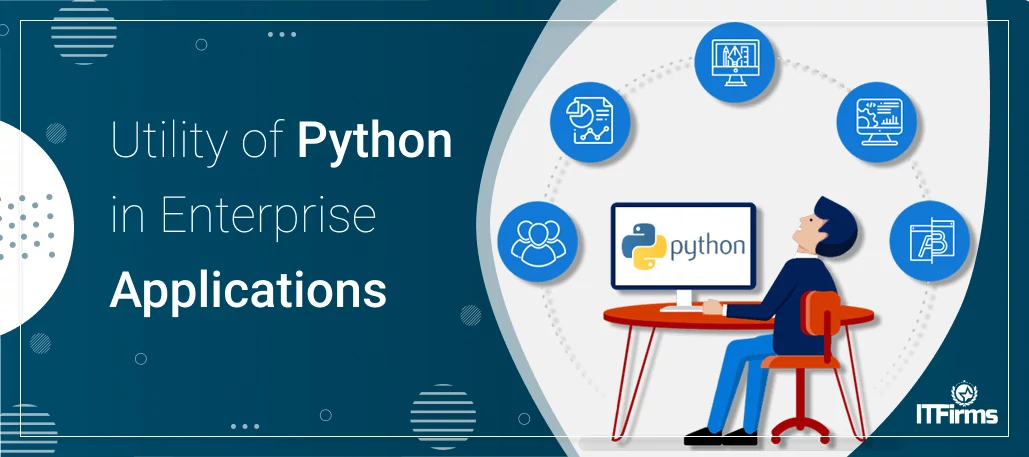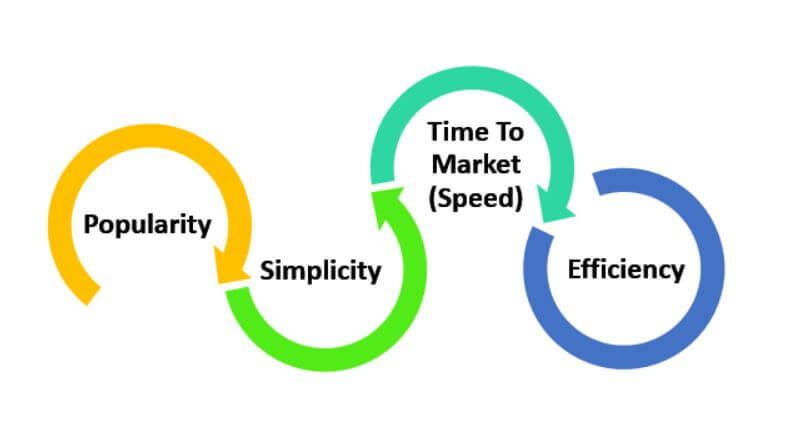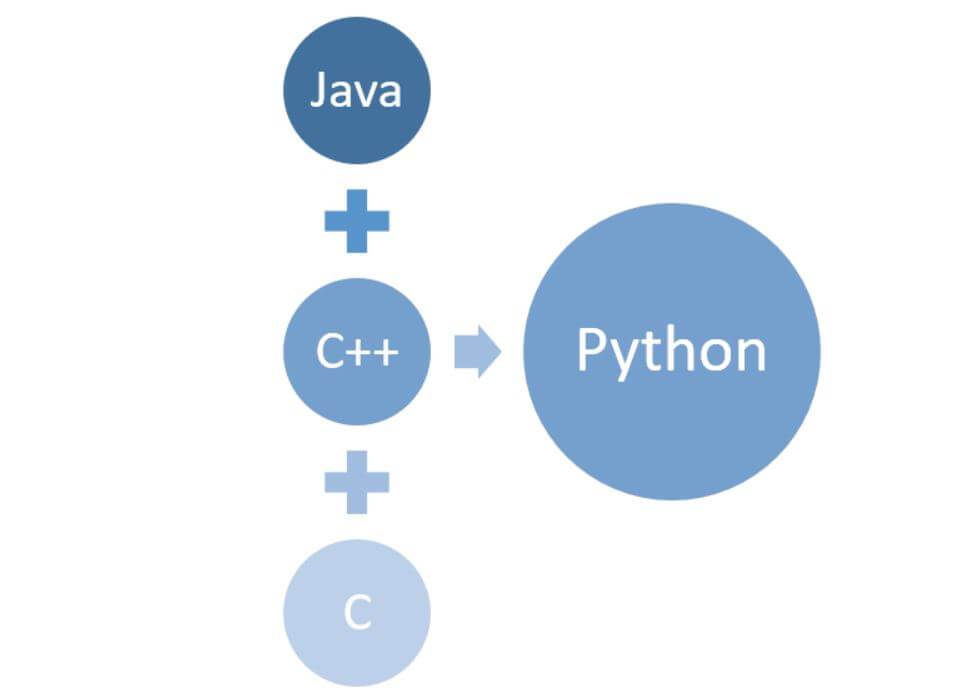
Utility of Python in Enterprise Applications
With all these platforms and development processes, the ever-present issue of legacy code management persists. Let’s see how Python improves the associated risk profile!
Table of Contents
- What is Python?
- Why is Python Preferable?
- Is Python suitable for enterprise application development?
- Taking a look at Python
- There’s one more reason why Python is preferable
- What a trade-off
- When and Why Should Python be used in projects?
- Advantages or Benefits of Python
- What Python development can do for your business?
- 9 Legacy Programming Skills Still In Demand
- Escaping the Generous Ambit of Python
Great expectations come with great responsibilities and it is the Enterprise Applications that always have to be up to the mark keeping up with the sky-high expectations. Organizations play their role on the pivot of strong domain expertise, solid experience, and a vision. Major challenges in the process are data security, access to data, scalability, integration with existing systems, operational efficiency, skillset and development speed.
Client-side Scripting used to be the main reason why Python was preferred over Perl a few years back, but the bigger reason to adopt Python is to automate trivial stuff and focus on more exciting use-cases.

What is Python?
It is a high-level programming language, that is interpreted, rather than compiled and is used to create general-purpose dynamic applications that focus on code readability. Python has been part of winning streak for software quality, productivity and maintainability at many organizations around the world.
Comparable to Java and C++, Python is an object-oriented language that can solve the purpose in very little coding. The availability of multiple programming paradigms makes it a convenient option to be used in larger organizations. It has a comprehensive standard library that has automated memory management and dynamic features.
Why is Python Preferable?
Python makes use of a modular programming approach and can be integrated along with any technologies. The community is vast with numerous libraries that account for building just about any functionality with ease.

Python can be used for web scraping, testing, computer graphics, data analysis, machine learning, big data analysis and internet of things (IoT) solutions. Python is universal and multipurpose. But for a few more reasons, like quicker and efficient web and app development, Python is being utilized even more with the presence of the Django Framework. This framework makes it convenient to code, providing lots of templates and creates rules to adapt a universal language to a particular task. This eases the process to build web applications as you get ready-to-use blocks you can construct with.
Frameworks like Django are a set of rules that set the boundaries useful to provide ready-to-use functionalities that can be modified later, speeding the development work for PHP development companies. Clean design, a vast library of components – eases the development of the feature-rich application.

Python is preferred more due to its versatile feature, shorted codes, being interactive, interpreted (not compiled), modular and dynamic, object-oriented (like Java, C, C++ and many more), portable, high-level (for both server and client-side programming), Extensible in C and C++ and Scalable. It can extend or get integrated with any legacy code to redefine the application (being dynamic).
Is Python suitable for enterprise application development?
It was once thought that Python is for QA, Java is for browser applets and Go is for DevOps and so on but all these languages approach problems from different angles. It depends upon the programmer’s mindset, the solution that they intend to implement, and how equipped they are than others. All these languages – C, C++, PHP, Perl, Golang, Lua, Lisp, Java might come equipped with virtual machines or compilers and might have their limitations that you need to be aware of so you can avoid falling into a big trap.
Taking a look at Python
Python has its major implementations like CPython has GIL (Global Interpreter Lock) etc. but if the language is optimized regularly, CPython gets faster on each minor version.
Python is and is-not preferred for Enterprise Application Development depending upon the requirements. Developers encounter situations where Python performance was not sufficient like in case of thread spawning, GIL supports one thread at a time and so on.
Many large enterprises have utilized Python in their core implementations: Instagram, Google, YouTube, DropBox, Paypal, etc.
There’s one more reason why Python is preferable
Going down a layer and making use of lower-level languages like C or C++: no Python GIL, no leaking of Go resources, no JVM startup slowness, etc. But doing this will add a ton of extra load and problems that need to be resolved.
What a trade-off
In presence of all the available high-level programming languages and subsequent frameworks, it is for the developers to decide whether they wish to write an intense program in 10 years or wish to write a decently fast program in 1 year. The time required to develop a program is equally important to the result of the program.
Therefore, the selection of a programming language depends upon performance, support, community, and ecosystem. Python signifies reliability and trustworthiness complementing to being exciting and highly performant. This makes Python a perfect choice for enterprise projects.
When and Why Should Python be used in projects?
- Favorite Language: Python was the most wanted language of 2019.
- Widely Used: Many of the world’s most successful products like Dropbox, Instagram, Netflix, Spotify, Reddit, Facebook, and Google were built with Python.
- Ease of Use: Google developers invented a simple development rule which says Python must be used wherever we can and C++ must be used wherever it is a must.
- Most popular: Python was also involved in the biggest Silicon Valley success story being the third most popular language used to build Facebook, just behind C++ and PHP.
- Favorite Framework: Instagram utilized the Django framework for running their largest deployment in 2016.
- Use Case 1: Reddit just chose to convert their entire platform written in Lisp into Python in 2005.
- Use Case 2: Engineers at Spotify made use of data analysis and back end services written in Python.
- Use Case 3: Netflix made use of Python for data analysis.
Advantages or Benefits of Python
- Rapid Application Building : Python has numerous libraries and is focused on reusing the quality code.
- Easy Integration : Python is the glue language that is easy to integrate with other components, acting as a patchwork for all programming languages, frameworks and external services, etc.
- Many modules and packages ready to use : Python modules are ready to use and can be integrated with various integrations. There is a lot to experiment with.
- Smooth Programming Cycle : The presence of Python’s interpreter makes the standard programming cycle (editing, testing, and debugging) easy.
- Python features fast Iteration that is a prerequisite for Rapid Application Development.
- Python accounts for great productivity which is probably one of the main reasons behind the popularity of Python.
- The simple syntax makes it easy to write, modify the code.
- Python is easy to learn and reuse.
- Documentation is not required as the code is well-written and can be understood without comments.
- Python has extensive support libraries that provide a string of operations, Internet, Web service tools, operating system, interfaces, and protocols.
- Python integrates enterprise application integration making it easy for web services by invoking COM or COBRA components. It possesses XML and powerful control capabilities calling directly through C, C++, Java via Jython or any other markup language running on modern operating systems through the same byte code.
- Use of Python to protect C++ Legacy Programs : It is still very difficult to create manual and complicated undertakings like in case of large telecommunication applications with application front-end that look simple to end user but have a fairly large and difficult interface. Additionally, an increased number of platforms and associated service access routes of desktops, servers, mobile, etc. Python helps invoke C++ programs from within a Python environment thus offering several C++ integration facilities.
What Python development can do for your business?
- Python has excellent business potential. It can build, automated and continuous compilation and testing, project management and bug tracking.
- Python is the major fuel behind scientific programming applications (NumPy and SciPy).
- Python has some libraries that are already useful for building blockchain-driven applications.
- Enterprise software needs to be integrated with legacy systems like databases and non-web applications. Python makes it easy to integrate with other languages quite easily with high-security standards.
- Python is simple and lowers cost by code reuse, easy integration and cutting time-to-market for all the products.
- Its simple syntax makes remote collaboration easy.
- The presence of open-libraries makes for precious solutions for financial, banking and insurance applications, thus bringing high business opportunities.
- It is safe to use and can handle very sensitive data related to finance and healthcare.
Besides This, 9 Legacy Programming Skills Still In Demand
Here are some:
- DB2
- C (It has spawned several languages, including C++, Java, JavaScript, C#, Perl, Python, Swift and many others)
- Cobol
- Assembly language
- Perl
- Delphi and Object Pascal
- Fortran
- REXX
- Pascal
Escaping the Generous Ambit of Python
Python is a high-level programming language providing for easy use of code lines, maintenance that can be handled and debugged easily. It has now traversed the world to become a computer giant all the more becoming one of the official programming languages of Google. Plus it is one of those technologies that is going to last as it makes integrations, code reuses easy and empowers C and C++ to support legacy applications.
